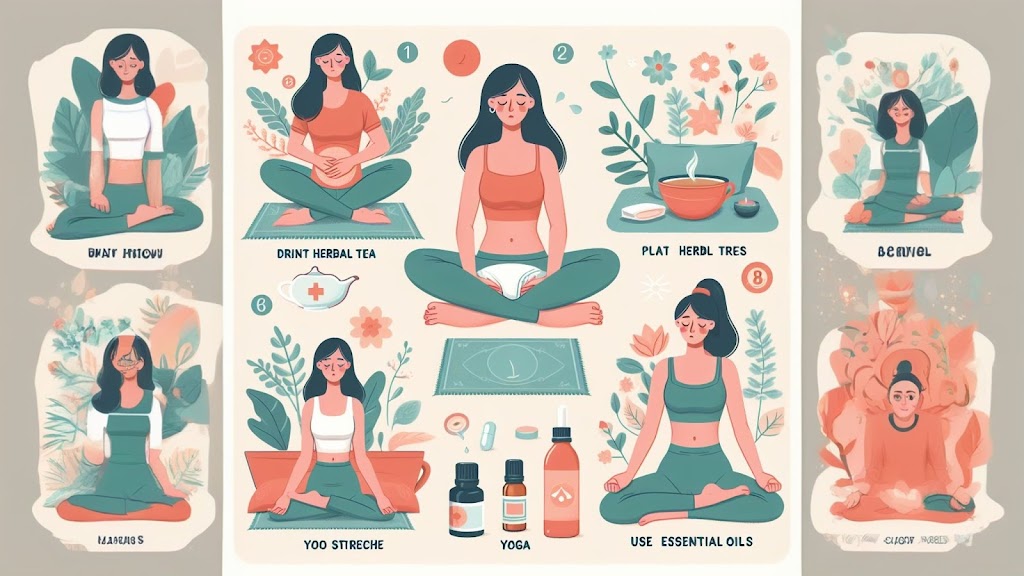Conquering Cramps: Effective Home Remedies for Period Pain
Period cramps, a universal experience for menstruating people, can range from a dull ache to debilitating pain that disrupts daily life. While there’s no one-size-fits-all solution, numerous effective home remedies can bring welcome relief. This guide explores various strategies to soothe cramps and navigate your period with more comfort.
Understanding the Root Cause
Uterine contractions are the primary culprit behind period cramps. As the uterus sheds its lining during menstruation, it contracts to expel the tissue. Prostaglandins, hormone-like substances, play a key role in these contractions. High prostaglandin levels can intensify cramping.
Heat Therapy: A Classic for Comfort
Applying heat directly to your lower abdomen and lower back is a time-tested remedy. Heat relaxes cramped muscles and improves blood flow, easing discomfort. Here are your options:
A heating pad or hot water bottle: A reliable and readily available solution. Fill the hot water bottle with warm (not scalding) water or use a heating pad on a low setting.
Warm bath: Immerse yourself in a relaxing warm bath. Add Epsom salts for an extra dose of muscle relaxation.
Rice sock: Fill a clean sock with uncooked rice, tie the end, and microwave it for a few minutes (check the temperature before applying).
Gentle Movement for Relief
Exercise might seem counterintuitive, but low-impact movement can be surprisingly effective. Physical activity promotes the production of endorphins, the body’s natural painkillers. Consider:
Light yoga: Focus on stretches that target the lower back and abdomen.
Walking: A brisk walk can improve circulation and ease muscle tension.
Swimming: The buoyancy of water provides gentle support while you move.
Dietary Tweaks for Period Harmony
What you eat can influence your cramps. Here are some dietary tips:
Hydration is key: Dehydration can worsen cramps. Aim to drink plenty of water throughout your cycle, especially during your period.
Anti-inflammatory foods: Opt for fruits, vegetables, and whole grains rich in antioxidants and omega-3 fatty acids, which have anti-inflammatory properties. Think berries, leafy greens, fatty fish, and nuts.
Limit inflammatory foods: Avoid processed foods, sugary drinks, and excessive red meat, as these can contribute to inflammation and worsen cramps.
Consider supplements: Consult your doctor about magnesium and vitamin D supplements, which may help alleviate cramps.
Harnessing the Power of Relaxation
Stress can exacerbate cramps. Relaxation techniques can help manage stress and reduce pain perception. Here are some options:
Deep breathing exercises: Focus on slow, deep breaths from your diaphragm to promote relaxation.
Meditation: Mindfulness meditation can help manage stress and improve your overall well-being.
Progressive muscle relaxation: Tense and relax different muscle groups in your body to release tension.
Taming the Tingles: How To Stop Restless Legs Immediately At Home
Over-the-Counter Relief
Over-the-counter pain relievers like ibuprofen or acetaminophen can effectively target cramps. Be sure to follow the dosage instructions carefully.
Alternative Therapies for Consideration
Some people find relief through alternative therapies. While research is ongoing, these options may be worth exploring:
Acupuncture: This traditional Chinese medicine practice involves inserting thin needles into specific points on the body. Studies suggest it may help alleviate menstrual cramps.
Massage therapy: A gentle massage of the lower abdomen and lower back can promote relaxation and ease discomfort.
When to Seek Professional Help
If home remedies don’t provide sufficient relief, excessively heavy bleeding, or other concerning symptoms occur, consult your doctor. They can help identify any underlying conditions and recommend appropriate treatment options.
Conclusion
Period cramps are a common experience, but they don’t have to rule your life. By incorporating these home remedies and lifestyle adjustments into your routine, you can effectively manage cramps and navigate your period with more comfort and ease. Remember, if home remedies prove inadequate, consulting a healthcare professional is always advisable.

